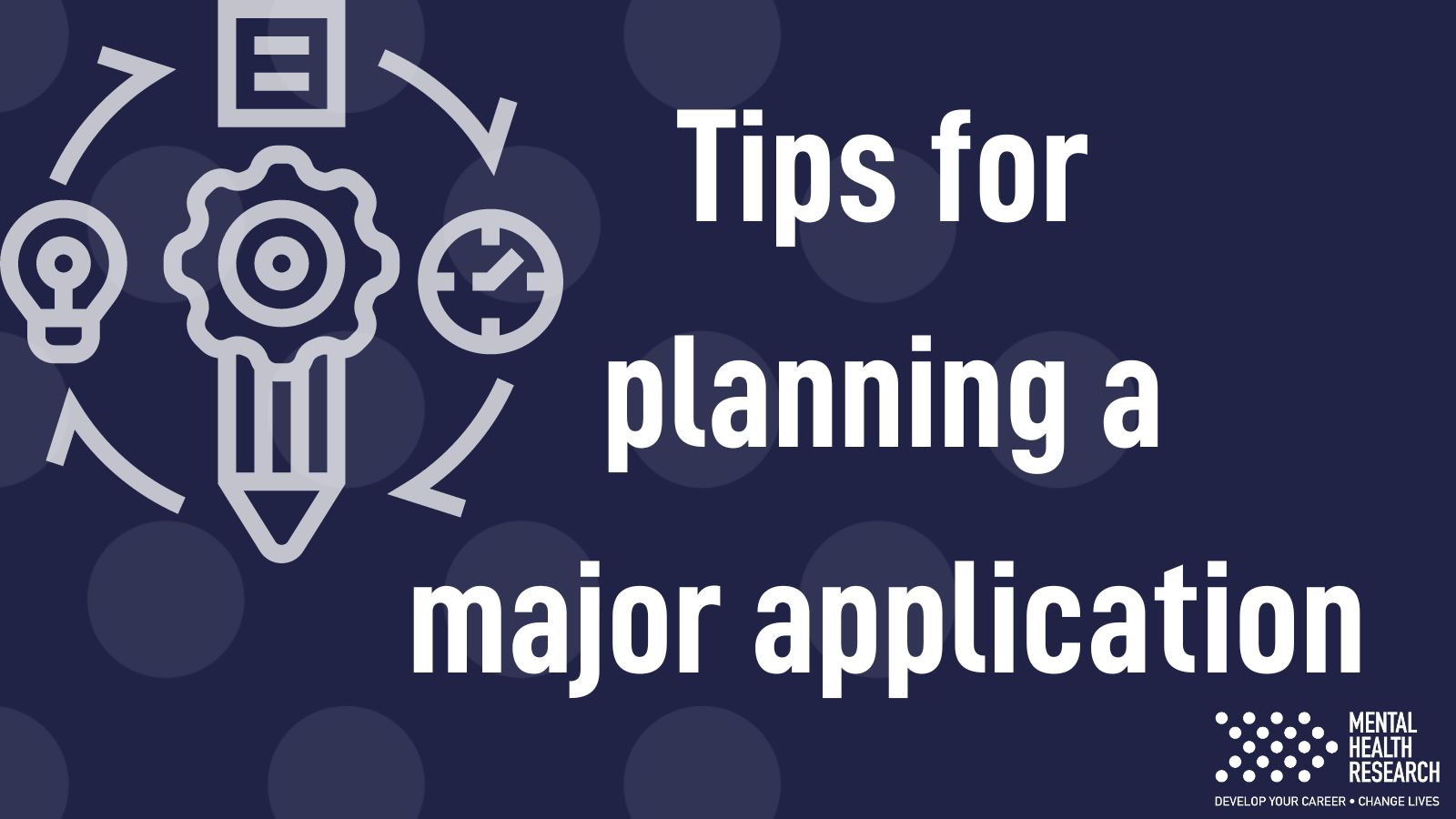
Getting a big grant or fellowship application together takes a very long time – often much longer than you might expect – certainly longer than the active application window. Many people have told us that it took them more than a year to get their application together. These funds are usually open to people from many disciplines and research areas, so the following applies to almost anyone in mental health research.
Rachael Kelley commented on how long these applications take in her video presentation about funding that she shared with us a few months ago. The whole video is definitely worth a look and can be found here: Top tips for your next mental health research funding application – Mental Health Research. She also has a really handy slide with a timeline for your application, which starts at +9months out!
Below are just a selection of tips which could help you begin to tackle to gargantuan task of a major funding application.
Use the cycle
Most of the major career development style applications such as the NIHR Postdoctoral Fellowship are cyclical and come around every year. Therefore it is a great idea to download and save the guidance notes for the scheme you are interested in, the cycle before you are planning to submit, to give you something to reference as you are getting things together.
Some examples are:
NIHR Doctoral Fellowship – 3 year PhD funding – currently open here until 1 February 2024
NIHR Advanced Fellowship – 2-5 year funding for salary, research expenses and training – currently open here until 18 January 2024
NIHR Senior Clinical and Practitioner Research Award – cover for 20-50% allocated time for research at postdoc level for up to 5 years – currently open here until 23 January 2024
Commonwealth Fund Harkness Fellowship – Funding to research in the US for one year – annual, just closed 1 November 2023
Wellcome Career Development Awards – funding to cover salary and research for 8 years – currently open here until 16 November 2023
Reach out to others for help/advice
There are lots of people out there who would be happy to give you some tips/advice/share a past application or feedback with you.
Some people to look for are:
- People who have been successful – is there someone at your institution who has a fellowship who you could meet for coffee? Or do you know someone through Twitter? You could also use our map and case studies to find people near you who might have received the funding you are after. Networking and reaching out to people can be intimidating but well worth it – just don’t reach out when you already have a tight deadline!
- People who have not been successful and are willing to share any feedback they have got
- People who can let you sit in on a review panel, which can help understand how the process works, and connect the things written on paper as requirements to reality. The NIHR has just published a blog by two chairs of review committees that is definitely worth a read here.
Pre-application support fund
A new NIHR funding scheme, currently in its first cycle, can help cover time costs when preparing an application.
As someone told us on Twitter – “ I could not have prepared an application without dedicated time to do so! These look great”
This grant can give you that time by providing financial support to set aside some time to prep an application. The NIHR are particularly encouraging people in regulated health care, social work and public health research to apply. This hopefully means mental health researchers are in good stead.
Have a look at the current round for applications here, it is open until 13:00 on 30 November 2023.
The NIHR RSS
The RSS is there to help, particularly if you have an idea and are struggling to get it into application form. The service used to be called the Research Design Service but has broadened it’s scope to Research Support Service, so will be there after an application is successful. The hubs can be really helpful, especially with things like PPI inclusion. Have a look at the RSS page for full information and for contact details. We imagine they get busy when applications are live so it is certainly worth contacting them very early on in your application journey.
For full information and contact details, head over to: Research Support Service | NIHR
General resources
If you are at the stage of just trying to figure out the various types of funding out there and looking at the specific funding streams as oppose to the general career development programmes, we have a couple of handy guides to the NIHR funding schemes – there are a lot of them and it can be quite overwhelming!
Many applications now ask for a narrative style CV – check out our overview post if you want to learn more about those, it also has links to some great resources: Narrative CV Explainer – Mental Health Research
Also, dont forget that you can search our case studies by funding programme to find people who have been successful at obtaining those major grants.
What are your tips for someone considering applying to one of the major multiyear grants or fellowships?
Were there things that you wish you had done in preparation, or things you did do which significantly contributed to your success?
Let us know on Twitter @MHRIncubator
